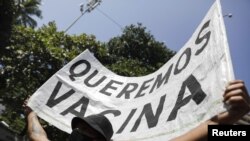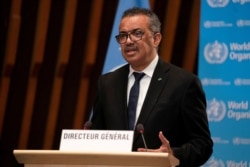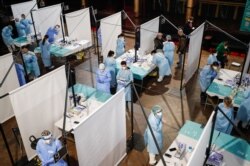The head of the World Health Organization (WHO) Friday urged the global community to donate COVID-19 vaccines to lower income countries, citing the urgent need for 10 million doses for a WHO-backed vaccine distribution program.
“COVAX is ready to deliver but we can’t deliver vaccines we don’t have,” WHO Director-General Tedros Adhanom Ghebreyesus said at a virtual news conference in Geneva.
COVAX, an abbreviation for the COVID-19 Vaccines Global Access initiative, aims to provide equitable access to vaccines worldwide to low- and middle-income countries.
“Bilateral deals, export bans, and vaccine nationalism have caused distortions in the market with gross inequities in supply and demand,” Tedros said. “Ten million doses are not much and it’s not nearly enough.”
Tedros’ appeal comes after India, a key supplier to the agency’s COVAX vaccine-sharing program, said it was prioritizing local needs.
The WHO chief said India’s move was “understandable” given the rising number of infections in India. He said talks were in progress with India to find a balance between local and international needs.
India said Friday it set a record with a tally of more than 59,000 new cases from the previous 24-hour period.
At the United Nations in New York, 181 nations signed onto a political declaration that calls for COVID-19 vaccinations to be treated as a global public good, ensuring affordable, equitable and fair access to vaccines for all.
“We can see the end of the crisis, but to reach it, we need to work together with a deeper sense of collaboration,” part of the declaration states.
Among the appeals are calls on nations to fully fund the COVAX facility to distribute vaccines to low-income and developing countries, scale up vaccine production through the distribution of technology and licenses and launch public information campaigns on the importance and safety of COVID-19 vaccines.
COVAX has so far distributed more than 31 million doses of vaccines to 57 countries.
“There is a race everywhere between the vaccines and the pandemic,” said Lebanon’s Ambassador Amal Mudallali, on behalf of the countries that drafted the document. “This race will be won before the start by the ‘haves,’ if there is no equitable, affordable sharing of vaccines.”
The Johns Hopkins Coronavirus Resource Center reported early Saturday there are more 126 million global COVID-19 infections. The research center updates its data constantly and provides expert input.
The United States has more cases than another country, with more than 30.1 million infections, followed by Brazil, with 12.4 million, and India, with 11.9 million, according to the center.
In Germany, officials warned residents not to make unnecessary trips to neighboring France, Austria, Denmark, or the Czech Republic because of rising coronavirus case numbers. Germany is also facing its own surge of infections, driven by a more transmissible coronavirus variant first identified in Britain.
The head of Germany’s Robert Koch Institute for infectious diseases, Lothar Wieler, said on Friday that the country’s current wave of coronavirus infections could be the worst so far and said 100,000 new daily infections is not out of the question.
“There are clear signals that this wave will be worse than the first two waves,” Wieler said. He urged people to stay home over Easter.
In the Czech Republic, Parliament extended a state of emergency, which gives the government extra powers to fight the pandemic until April 11.
Spain’s coronavirus infection rate continued to rise Friday after a week of increasing rates. Health officials reported 7,586 new cases Friday, bring the country’s overall total to 3.26 million cases, and threatening to reverse gains made during a previous stretch of declining cases.
In the United States, the White House announced that three more cities — Boston, Massachusetts; Norfolk, Virginia; and Newark, New Jersey — are getting new federally run mass vaccination centers as part of President Joe Biden’s new goal of vaccinating 200 million Americans by the end of April. Biden had previously set a goal for vaccinating 100 million Americans during his first 100 days in office, a goal he surpassed last week.
Data from the U.S. Centers for Disease Control and Prevention Friday showed that 27% of the U.S. population has received at least one vaccine dose and nearly 15% have been fully vaccinated.
A French monastery in France’s Burgundy region that sold its artisanal cheeses to visitors and restaurants before the COVID pandemic, now possesses a surplus of 4,000 cheeses, according to AFP, the French news agency.
“We tried explaining to our 75 cows that they needed to produce less milk,” Brother Jean-Claude told AFP, “but they don’t seem to have understood” that the abbey now has 2.8 tons of excess cheese.
The monks at the Cîteaux Abbey, founded in 1098 have embraced 21st century technology, however, to solve their cheese surplus problem. They sold their raw-milk, semi-soft cheeses through a website that sells products made by abbeys and there is now a waiting list for their product.
Margaret Besheer contributed to this report.








